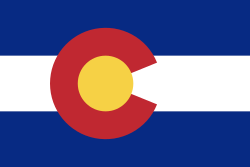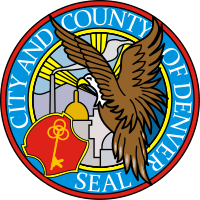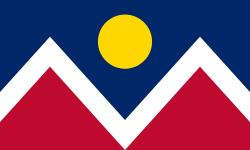Colorado Rapids
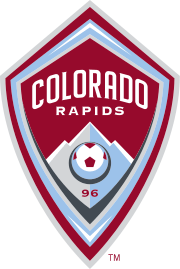 | |||
| Founded | June 6, 1995 | ||
|---|---|---|---|
| Stadium | |||
| Capacity | 18,061, expandable to 19,680[1] | ||
| Owner |
Stan Kroenke (Kroenke Sports & Entertainment) | ||
| Head coach | Anthony Hudson | ||
| League | Major League Soccer | ||
| 2017 |
Western Conference: 10th Overall: 20th Playoffs: Did not qualify | ||
| Website | Club website | ||
|
| |||
The Colorado Rapids are an American professional men's soccer team based in the Denver suburb of Commerce City, Colorado. The Rapids compete in Major League Soccer as a member of the Western Conference. The franchise began play in 1996 as one of the charter clubs in MLS.
Colorado won the MLS Cup in 2010, their second MLS Cup appearance. The first appearance was in 1997, losing to D.C. United. They were also runners up of the Lamar Hunt U.S. Open Cup in the 1999 tournament, where they lost to the Rochester Raging Rhinos, which was the last time a non-MLS team has won the Cup. The Rapids play their home games at Dick's Sporting Goods Park in Commerce City since its opening in the 2007 season.
History
Early years
The Colorado Rapids were one of the ten founding clubs of Major League Soccer, owned and operated by the Anschutz Corporation. The inaugural 1996 season was a forgettable one for Colorado. Despite fielding experienced players like Shaun Bartlett, Chris Henderson, Chris Woods, Roy Wegerle and Marcelo Balboa, and head coach Bob Houghton, the team finished last in the Western Conference with the worst record in the league. Balboa became the first player ever to score for the club and also the first to record a goal at Mile High Stadium (in 1996).
For the following season, there was a new head coach (Glenn Myernick) and a new general manager, Dan Counce. Myernick and Counce brought new faces to the squad including Paul Bravo, Wolde Harris, Ross Paule, and keeper Marcus Hahnemann. The team struggled early on, but rallied to grab a postseason spot. The Rapids pulled off two upsets and advanced to the 1997 MLS Cup final. Chris Henderson scored a mid-air volley past Dallas keeper Mark Dodd in the 87th minute in the Western Conference final, ensuring Colorado's place in the MLS Cup final. They scored in the Cup thanks to a goal by Adrián Paz but lost the final 2–1 to D.C. United.
Colorado continued on a roller coaster of success alternating with major disappointment: Myernick brought in more new players including Anders Limpar and Marcus Hahnemann and the club made it to the 1999 U.S. Open Cup final, only to be upset 2–0 by the Rochester Raging Rhinos.
The 2000 season boasted two of the more memorable moments in Rapids history. The first was Marcelo Balboa's famous bicycle kick which garnered the Goal of the Year. The second was clinching a playoff spot in the final game of the season against the Los Angeles Galaxy, with Paul Bravo scoring in the 97th minute.
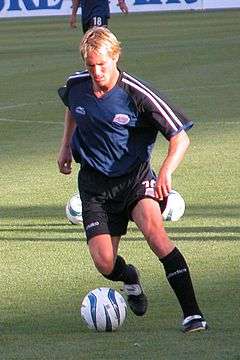
In 2001 Tim Hankinson took the reins as Colorado's new head coach. Scottish striker John Spencer also joined the club that year. While Hankinson did bring effective players like Mark Chung, Chris Henderson, Carlos Valderrama, and Joe Cannon to the squad—and made the playoffs every year—Hankinson also signed a number of expensive and unsuccessful players including Zizi Roberts and Darryl Powell. During his coaching stint, the club also traded away club legend Marcelo Balboa, whose career was nearing its end....he played 1 game with New York before retiring.
2002 was a banner year for the Rapids, and they started off their new year at their new home of Invesco Field at Mile High by acquiring two powerhouses and future stars for the team, Pablo Mastroeni and Kyle Beckerman from the defunct Miami Fusion F.C. Chris Henderson went down in history as the first player ever to score a goal in the brand-new stadium. Mark Chung posted record numbers on the season, and Mastroeni shone for the U.S. Men's National Team in that year's World Cup. The club advanced to the MLS Cup Playoffs Semifinals, and although they didn't advance to the MLS Cup, the Rapids did clean up at the MLS postseason awards ceremonies. General Manager Dan Counce was named MLS Executive of the Year and 4 other Rapids front office staff were named as the best at their positions in MLS that year. Mark Chung was named to the League Best XI squad and also took home the MLS Fair Play Award. Finally, the Rapids ticket sales staff was named best in the league after the Rapids finished first in MLS average home attendance for the first time ever with an average home crowd of over 20,000 fans per home game.
2003 saw the club change their identity, with a rebranding that brought in the new team identity and color scheme of black and blue. Mark Chung and forward John Spencer had banner years. Spencer, the Rapids' team captain, set a new team record by scoring in six consecutive games and tied his own team record with 14 goals on the season. He finished the season third in MLS with 33 points, was a finalist for Honda MVP and was named to the MLS Pepsi Best XI. Joining him on the Best XI was Chung, who tied his career high of a year prior with 11 goals and was second on the team with 28 points. This was Chung's second consecutive appearance on the MLS Best XI and it marked the first time in league history that two Rapids had been so honored in the same season.
The Rapids set a new MLS record for the lowest home Goals Against Average over an entire season with at 0.53 by only allowing eight goals in 15 matches at Invesco Field during the season, and never more than one in a single game. After Kansas City broke the Rapids’ MLS record 16 game home undefeated streak on June 9, the Black & Blue reeled off 11 more undefeated home games. On the year Colorado was undefeated when scoring more than one goal, a credit to the play of goalkeeper Joe Cannon and the suffocating defense.
Kroenke Sports Enterprises purchased the club in late 2004 and made several changes before the 2005 season. In the front office, KSE replaced long-time executive GM Dan Counce with Charlie Wright, who appointed Fernando Clavijo as the new head coach.
Clavijo and Wright brought in many new additions to the squad including Jeff Cunningham, Terry Cooke, and David "Dedi" Ben Dayan. The team saw steady improvement over the course of the 2005 season. The season's success was highlighted by a dramatic playoff victory over FC Dallas in a penalty shootout, and their claiming of the brand new Rocky Mountain Cup in the tournament's inaugural year.
Colorado's 2006 season seemed to parallel trends from previous years. Clavijo's squad performed inconsistently and only secured a playoff spot at the very last instant. Lightning managed to strike twice as they duplicated their 2005 playoff run by again beating FC Dallas in penalties only to crash out of the Western Conference Final by a two-goal deficit. Other highlights from the final black and blue season include securing the Rocky Mountain Cup for the second consecutive year and winning the MLS Reserve Division.
2007–13
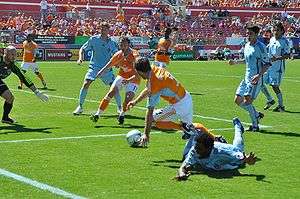
New head executive Jeff Plush took over the business responsibilities of the club when he was named Managing Director in January 2006. The club's colors were changed to burgundy and blue, to "mesh" with other clubs owned by Kroenke Sports Enterprise. This accompanied the introduction of a state of the art soccer stadium and fields complex, Dick's Sporting Goods Park, and formulating relationships with Arsenal [2] of the English Premier League and Pachuca of Mexico.
The Rapids enjoyed a successful inaugural year at Dick's Sporting Goods Park, hosting numerous international exhibitions and tournaments on the stadium's complex, and the 2007 MLS All-Star Game; on the pitch though the team's record was 9–13–8. The team started out strong with a 2–1 victory over D.C. United in frigid conditions. Herculez Gomez became the first player to score in the Rapids' brand new stadium. The team had a long winless streak that saw them sink in the standings. Colorado ultimately finished just shy of a playoff spot. Major low points in the season included an embarrassing 5–0 loss to the Seattle Sounders in the Lamar Hunt U.S. Open Cup, and a defeat to Real Salt Lake that saw them lose both a playoff berth and the possession of the Rocky Mountain Cup. The club won the MLS Reserve League for the second consecutive year.
Heading into the 2008 season, Rapids GM Charlie Wright added depth to the midfield and defense. Major signings included Christian Gómez and Jose Burciaga Jr. The 2008 season saw a resurgent Rapids side, which started off the season with a complete thrashing of David Beckham and the LA Galaxy by a 4–0 score on Opening Day to launch the season. However, an inconsistent mid-season stretch where, for 13 games,[3] the Rapids could not win two games in a row or lose 2 in a row, saw Clavijo resign from the head coach position for personal reasons, and saw Gary Smith, an assistant coach who came from the Arsenal F.C. system, take over on an interim basis with 11 games left in the season. Under Smith's direction, the Rapids surged into the playoff race, with two key away wins, but fall short of the playoffs in the last game of the season, against Real Salt Lake. Salt Lake tied the Rapids 1–1 in the 90th minute of that game to eliminate the Rapids from playoff contention.[3] Because of the signs of improvement shown in the last 11 games, Smith was hired as the head coach.
The 2009 campaign featured head coach Gary Smith in his first full season.[4] Smith took over the reins from Fernando Clavijo as interim manager after Clavijo resigned. Smith's first appointment was ex-England international Steve Guppy as his assistant; Guppy had spent the previous season at USL-1 team Rochester Rhinos as their player assistant coach. Shortly after, Rapids veteran midfielder Pablo Mastroeni re-signed with the club for four years after mulling potential offers from Europe.[4] The Rapids also signed new four-year contracts with midfielders Colin Clark and Nick LaBrocca and defenders Jordan Harvey and Kosuke Kimura.[5] The Colorado Rapids acquired former QPR and Chicago Fire goalkeeper Matt Pickens to replace Senegalese goalkeeper Bouna Coundoul. The other major roster move included the arrival of Ivan Guerrero from D.C. United in exchange for midfielder Christian Gomez and backup goalkeeper Mike Graczyk.[6] The media criticized the Rapids for not making more roster changes for the 2009 season. However, the core of the team remained intact.[7]
MLS Champions
The 2010 campaign featured many roster moves: Danny Earls, Jeff Larentowicz, Claudio Lopez, Quincy Amarikwa, Ian Joyce, and Wells Thompson join the club. The offseason also included a new contract for star forward Conor Casey. The Colorado Rapids also excited many of the ultras supporter groups by the creation and construction of a supporters terrace within Dick's Sporting Goods Park.[8] During the summer transfer window, the Colorado Rapids signed academy youth player Davy Armstrong, and brought in defender Anthony Wallace from FC Dallas. Colorado also sent Mehdi Ballouchy to New York Red Bulls in exchange for Macoumba Kandji and acquired Brian Mullan from Houston Dynamo in exchange for Colin Clark. Following these changes, Colorado qualified for the MLS Cup playoffs and defeated the Columbus Crew in the first round. On November 13, Colorado hosted the San Jose Earthquakes in the MLS Eastern Conference Championship and won by a score of 1–0, leading to the team's first trip to the MLS Cup since 1997. Colorado faced off against FC Dallas in the finals. During the final, the Rapids trailed 1–0 at half time. Conor Casey equalized in the second half to send the game to extra time. Macoumba Kandji helped set up the game-winner that went off FC Dallas defender George John. Colorado won the 2010 MLS Cup 2–1, Colorado's first MLS Cup championship and first major trophy in the club's history.
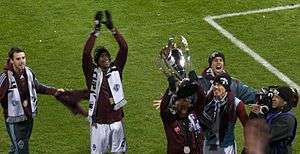
The 2011 campaign led to no roster changes. However, Sanna Nyassi and Tyrone Marshall were signed from Seattle Sounders FC. Joseph Nane and Josh Janniere were additions from Toronto FC. Local product Steven Emory was signed after an open tryout during preseason. The Rapids made the headlines when Irish International and former Hull City striker Caleb Folan signed with the club. The primary departure was defender Julian Baudet. Since Colorado won the 2011 MLS Cup, they automatically qualified for the group stages of the 2011–2012 CONCACAF Champions League. On September 9, Colorado signed versatile defender Miguel Comminges. The Guadeloupe International can play at either Left or Right back. On September 13, Comminges made his debut for Colorado as a substitute in a 4–1 home loss to Club Santos Laguna in the CONCACAF Champions League.
The 2012 season began with several changes to the club. Oscar Pareja was appointed head coach following the departure of Gary Smith. The team traded Sanna Nyassi to the Montreal Impact, and Macoumba Kandji to Houston Dynamo. Acquiring Hunter Freeman, Jaime Castrillón, Luis Zapata, and young Kamani Hill and the loan of young talent Martín Rivero the Rapids looked to begin on a positive note. After defeating the Columbus Crew 2–0 on opening day, things seemed promising. However, as the season ticked by, things started to turn for the worst. Looking for a turn around, Hárrison Henao was loaned and Brazilian Edu was signed. In July, Kosuke Kimura was traded to the Portland Timbers. Shortly after, defender Tyson Wahl was brought in via trade from the Montreal Impact. After a poor season, the Rapids looked for a late season turn around when they signed Hendry Thomas from Wigan Athletic. The Rapids were eliminated from play-off contention in late September ending hopes for another MLS cup.
The 2013 season for the Rapids saw massive changes made to the team. All-time leading goal scorer Conor Casey was released and Omar Cummings would be traded during the offseason, the Forward duo combining for 89 goals in the Rapids' careers. With the majority of the 2010 MLS Champions team gone (only 5 players remaining on the squad), the team looked considerably different. Coach Oscar Pareja wanting a squad of younger, more athletic players. Colorado finished the 2013 season campaign with a 14–11–9 (W-L-T) record which placed them fifth in the Western Conference, eighth in the overall standings. They were eliminated in the knockout round in the playoffs. During the off-season, Oscar Pareja revealed his desire to return to FC Dallas to be the head coach there after taking the opportunity to do so. Eventually Colorado found his successor which would be none other than Colorado veteran Pablo Mastroeni who had previously retired as a player.
2014–present
Under Mastroeni's first year as head coach, Colorado finished eighth in the West and seventeenth overall having 8 wins, 18 losses, and 8 ties having the Rapids fail to qualify for the MLS Cup Playoffs, after previously qualifying last year. Despite an upper-mid table performance to start the season, the club was plagued heavily by injuries, causing the team to go winless in their final fourteen matches of the season. In the U.S. Open Cup, the Rapids were eliminated from the tournament to the Atlanta Silverbacks. Additionally, they were unable to defend their Rocky Mountain Cup title, losing to rivals, Real Salt Lake.
During the off-season following the 2015 season, where Colorado finished last in the Western Conference, The Rapids had made major changes in their line up, which includes acquiring players: Gashi, Jermaine Jones, and Tim Howard, who will join later in the season during the Summer transfer window.
Colors and badge
 Colorado Rapids first logo (1996–2001)
Colorado Rapids first logo (1996–2001)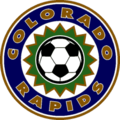 Colorado Rapids second logo (2001–06)
Colorado Rapids second logo (2001–06)
The Rapids' image has evolved a great deal since their inception. The team has undergone two complete re-brandings. Originally using green as the primary uniform color, the team changed to black and blue for the 2003 season.
As Colorado were preparing to move into Dick's Sporting Goods Park for the 2007 season, the club re-invented themselves again to more closely align with the DNA and color scheme of other KSE teams, changing their colors to burgundy and blue, and creating a brand new shield logo to fit in with more traditional global soccer marks.
Colorado has had three logos in their history. They originally first used the "river" logo as their primary crest with the "circular" logo as a secondary one. In 2002, the two logos would switch, with the "circular" one becoming the primary. For the 2007 re-branding, the Rapids created the new shield-style logo, which is the one that is currently used today. Its main features consist of a mountain representing the Rocky mountains in the region as well as the number 96, referring to the franchise's Inaugural season.
The original look of the Rapids sported a predominantly white kit with green trim, when the club's uniform supplier was Puma. Other minor colors such as gold and blue were occasionally incorporated, with the club's association with Reebok. Eventually black became more heavily used and eventually overtook white as the more dominant color that accompanied the green, when the club switched to Kappa.
The Rapids underwent an image change prior to the 2003 season. Following the club's switch to Atletica, the uniform colors switched to black and blue vertical stripes, similar to the uniforms worn by Italian Serie A club Inter Milan. The blue and black vertical stripes remained almost unchanged when MLS adopted Adidas as their league wide kit sponsor.
The uniforms underwent one last change for the 2007 season. The Rapids now sport burgundy(#92032e) and sky blue(#99bfdc) as their primary colors. The Colorado Rapids also have a brand new third uniform, consisting of a white shirt, white socks and burgundy shorts.
The Rapids' home jersey for 2013 featured the same burgundy primary color and featured the names of all season ticket holders imprinted in the fabric. The Rapids also had a special away jersey for the 2013 season, featuring the colors of the Colorado state flag.[9]
The club's use of burgundy led to Scottish pop band Little Eye, fronted by the brother of Rapids player Jamie Smith, writing a song about the team called "Burgundy Sky", which is now used as the Rapids official anthem.[10]
The Colorado Rapids were the last existing MLS club to earn a paid sponsorship deal on the front of their jerseys. In May 2014, the club announced a five-year sponsorship deal with Ciao Telecom.[11] In October 2014, the Rapids sued Ciao for missed payments[12] and quietly disassociated from the company. The club later reached an agreement with Transamerica as a shirt sponsor for two seasons starting in 2015. The Rapids then extended their agreement with Transamerica in March 2016 to go through the 2019 season.
Stadium

| Name | Location | Years in use |
|---|---|---|
| Mile High Stadium | Denver, Colorado | 1996–2001 |
| Invesco Field at Mile High | 2002–2006 | |
| North Area Athletic Complex | Arvada, Colorado | 2003; 1 game in U.S. Open Cup |
| Dick's Sporting Goods Park | Commerce City, Colorado | 2007–present |
The Rapids play their home games at Dick's Sporting Goods Park in Commerce City, Colorado (approximately 8 miles north of downtown Denver). The stadium capacity is 19,680 and cost $131 million to construct. It is also referred to as a soccer-specific stadium, since it was constructed for the Colorado Rapids. The soccer stadium opened on April 7, 2007. The stadium complex includes youth soccer fields and various retail establishments, and is owned and operated by Kroenke Sports Enterprises (KSE) which also owns the Colorado Avalanche, Denver Nuggets, Colorado Crush and Colorado Mammoth sports franchises, and is a co-owner of English Premier League club Arsenal.
Prior to moving to DSG Park in 2007, Colorado Rapids shared Mile High Stadium and then Invesco Field at Mile High with the Denver Broncos American football franchise. The Rapids have one of the highest discrepancies between their home record and away record in MLS. From their inception in 1996 through the 2014 season, the Rapids record at home was 146–73–6, winning about 65% of their matches at home. However, the Rapids were only 70–164–4 on the road during that same time-span, winning only 29% of their games on the road.[13]
Club culture
The Rocky Mountain Cup
With Major League Soccer's expansion in 2005, Real Salt Lake became the second team in the Rocky Mountain region and the Rapids' closest neighbor and therefore geographical rival. The marketing departments and supporters clubs of the two clubs created a regular-season competition between the two sides to foster and memorialize this budding rivalry. Each season, the Rocky Mountain Cup is determined by the winner of the head-to-head fixtures within league play.
Supporters

The Rapids had strong fan attendance in 2002 when they led the league in average fans per game.[14] For 2011–12 CONCACAF Champions League (CCL) games, the Supporters Terrace was officially closed. CONCACAF regulations require "all-seater" stadiums, and the terraces at Dick's Sporting Goods Park are standing-only areas with no stadium seating. CCL group stage fixtures have seen the Pid Army and the Bulldog Supporters Group relocated to either midfield in the East stands (against Isidro Metapán) or directly behind the South goal in sections 117 and 118 (against Santos Laguna and Real España). In 2012, it was revealed that the Rapids had 3,561 season ticket holders after the club's front office mistakenly emailed a spreadsheet that contained a list of every season ticket holder in the season ticket base. The front office admitted to the mistake in a follow-up email to the season ticket holders.[15] On February 9, 2013, the leaders of the club's three supporters groups—Class VI, the Pid Army and the Bulldog Supporters Group—announced that they would combine into one group going forward: Centennial 38.[16]
Broadcasting
Rapids matches appear on several channels including Altitude Television, which is owned by Kroenke Sports Entertainment as are the Colorado Avalanche and Denver Nuggets. Major League Soccer determined in 2007 that every game must be televised, either through a regional (or local) TV station, or a national channel.
All games are broadcast on television by Altitude, the official television partner of the Rapids, or else via nationally available channels, including ESPN/ESPN2, Fox Sports 1/Fox Sports 2, and Univision/Unimas/Univision Deportes Network, or the MLS Direct Kick package.
Prior to 2013, the play-by-play duties were covered by a variety of voices, notably Todd Romero and Marc Stout, before the Rapids brought in former BBC sports broadcaster, Richard Fleming. Fleming, who spent 16 years at the BBC and also worked for Arsenal TV, is joined by U.S. legend Marcelo Balboa as color analyst, with Ally Sturm taking on sideline reporting duties.
Fleming and Balboa co-host a 30-minute preview show before each game, calling the home matches from Dick's Sporting Goods Park, and the road games from Altitude's studios.
Players and staff
- For details on former players, see All-time Colorado Rapids roster.
Current roster
Where a player has not declared an international allegiance, nation is determined by place of birth. Squad correct as of June 27, 2018.[17]
Out on loan
Where a player has not declared an international allegiance, nation is determined by place of birth.
| No. | Position | Player | Nation |
|---|---|---|---|
| 13 | Defender | Sam Vines (on loan to Charlotte Independence until 30 November 2018) | |
| 20 | Midfielder | Ricardo Perez (on loan to Charlotte Independence until 30 November 2018) | |
| 23 | Defender | Kip Colvey (on loan to Colorado Springs Switchbacks until 30 November 2018) | |
| 50 | Goalkeeper | Andrew Dykstra (on loan to Charlotte Independence until 30 November 2018) | |
| — | Defender | Mike da Fonte (on loan to Phoenix Rising FC until 30 November 2018) |
Head coach history
| Name | Nat | Tenure |
|---|---|---|
| Bob Houghton | (1996) | |
| Roy Wegerle (interim) | (1996) | |
| Glenn Myernick | (1997–00) | |
| Tim Hankinson | (December 20, 2000 – December 15, 2004) | |
| Fernando Clavijo | (December 22, 2004 – August 20, 2008) | |
| Gary Smith | (November 11, 2008 – November 7, 2011) | |
| Óscar Pareja | (January 6, 2012 – January 4, 2014) | |
| Pablo Mastroeni | (March 8, 2014 – August 15, 2017) | |
| Steve Cooke (interim) | (August 15, 2017 – November 29, 2017) | |
| Anthony Hudson | (November 29, 2017 – present) |
General manager and sporting director history
| Name | Nat | Tenure |
|---|---|---|
| Dan Counce | 1997–2005 | |
| Pádraig Smith | 2014–present |
Gallery of honor
The Rapids Gallery of Honor was established in 2003 to honor the club's all-time top players. The Gallery of Honor is commemorated with signage on the main stand on the west end of Dick's Sporting Goods Park with the players' names and uniform numbers. The two inaugural entrants were Marcelo Balboa and Paul Bravo, co-entered in the Gallery's formation during halftime of the Rapids' home match on July 4, 2003 at Invesco Field at Mile High.[18]






Honors
- Winners: 2010
- Runners Up: 1997
- Runners Up: 2016
- Runners up: 1999
Reserve and friendly
- MLS Reserve Division (2) 2006, 2007
- Rocky Mountain Cup (4) 2005, 2006, 2013, 2015
Team records
Year-by-year results
| Season | Regular Season | MLS Playoffs | U.S. Open Cup | CONCACAF Champions' League |
|---|---|---|---|---|
| 1996 | 5th, West (11–21) | Did not qualify | Semifinals | Did not qualify |
| 1997 | 4th, West (14–18) | Final | 3rd Round | |
| 1998 | 3rd, West (16–16) | Quarterfinals | Did not enter | Qualifying Round |
| 1999 | 4th, West (20–12) | Quarterfinals | Final | Did not qualify |
| 2000 | 3rd, West (13–15–4) | Quarterfinals | 2nd Round | |
| 2001 | 4th, West (5–13–8) | Did not qualify | 2nd Round | Not held |
| 2002 | 4th, West (13–11–4) | Semifinals | Quarterfinals | Did not qualify |
| 2003 | 3rd, West (11–12–7) | Quarterfinals | Quarterfinals | |
| 2004 | 3rd, West (10–9–11) | Quarterfinals | 4th Round | |
| 2005 | 3rd, West (13–13–6) | Semifinals | 4th Round | |
| 2006 | 4th, West (11–13–8) | Semifinals | Quarterfinals | |
| 2007 | 4th, West (9–13–8) | Did not qualify | 2nd Round | |
| 2008 | 4th, West (11–14–5) | Did not qualify | ||
| 2009 | 6th, West (10–10–10) | |||
| 2010 | 5th, West (12–8–10) | Champions | ||
| 2011 | 5th, West (12–9–13) | Quarterfinals | Group stage | |
| 2012 | 7th, West (11–19–4) | Did not qualify | 4th Round | Did not qualify |
| 2013 | 5th, West (14–11–9) | Knock Out Round | 3rd Round | |
| 2014 | 8th, West (8–18–8) | Did not qualify | 5th Round | |
| 2015 | 10th, West (9–15–10) | Did not qualify | 5th Round | |
| 2016 | 2nd, West (15–6–13) | Semifinals | 5th Round | |
| 2017 | 11th, West (7-18-5) | Did not qualify | 5th Round | Not held |
| 2018 | 11th, West (6-17-6) | Did not qualify | 4th Round | Group stage |
Year-by-year stats
| Season | League Record | Top Scorer | |||||||
|---|---|---|---|---|---|---|---|---|---|
| Points | GP | W | L | D | GF | GA | Name | Goals | |
| 1996 | 29 | 32 | 11 | 21 | 0 | 44 | 59 | Jean Harbor | 11 |
| 1997 | 38 | 32 | 14 | 18 | 0 | 50 | 59 | Paul Bravo | 8 |
| 1998 | 44 | 32 | 16 | 16 | 0 | 62 | 69 | Wolde Harris | 13 |
| 1999 | 48 | 32 | 20 | 12 | 0 | 38 | 39 | Jorge Dely Valdés | 10 |
| 2000 | 43 | 32 | 13 | 15 | 4 | 43 | 59 | Junior Agogo | 10 |
| 2001 | 23 | 26 | 5 | 13 | 8 | 36 | 47 | John Spencer | 14 |
| 2002 | 43 | 28 | 13 | 11 | 4 | 43 | 48 | C. Carrieri, M. Chung & C. Henderson | 11 |
| 2003 | 40 | 30 | 11 | 12 | 7 | 40 | 45 | John Spencer | 14 |
| 2004 | 41 | 30 | 10 | 9 | 11 | 29 | 32 | Jean Philippe Peguero | 7 |
| 2005 | 45 | 32 | 13 | 13 | 6 | 40 | 37 | Jeff Cunningham | 12 |
| 2006 | 41 | 32 | 11 | 13 | 8 | 36 | 49 | Kyle Beckerman & Nicolás Hernández | 7 |
| 2007 | 35 | 30 | 9 | 13 | 8 | 29 | 34 | Jovan Kirovski | 6 |
| 2008 | 38 | 30 | 11 | 14 | 5 | 44 | 45 | Conor Casey | 11 |
| 2009 | 40 | 30 | 10 | 10 | 10 | 42 | 38 | Conor Casey | 16 |
| 2010 | 46 | 30 | 12 | 8 | 10 | 44 | 32 | Omar Cummings | 14 |
| 2011 | 49 | 34 | 12 | 9 | 13 | 44 | 41 | Jeff Larentowicz | 7 |
| 2012 | 37 | 34 | 11 | 19 | 4 | 44 | 50 | Jaime Castrillon | 8 |
| 2013 | 51 | 34 | 14 | 11 | 9 | 45 | 38 | Deshorn Brown | 10 |
| 2014 | 32 | 34 | 8 | 18 | 8 | 43 | 62 | Deshorn Brown | 10 |
| 2015 | 37 | 34 | 9 | 15 | 10 | 33 | 43 | Kevin Doyle | 5 |
| 2016 | 58 | 34 | 15 | 6 | 13 | 39 | 32 | Shkëlzen Gashi | 9 |
| 2017 | 33 | 34 | 9 | 19 | 6 | 31 | 51 | Dominique Badji | 9 |
| Total | 891 | 696 | 257 | 295 | 144 | 899 | 1,009 | Conor Casey | 50 |
Note: MLS did not allow ties prior to the 2000 season as games were decided by shootout when tied at full-time.
By opponent
| Team | W | L | D | Total |
|---|---|---|---|---|
| Sporting Kansas City | 22 | 25 | 13 | 60 |
| FC Dallas | 22 | 32 | 14 | 68 |
| San Jose | 19 | 28 | 15 | 62 |
| Tampa Bay 1 | 5 | 10 | 0 | 15 |
| New York Red Bulls | 18 | 16 | 7 | 41 |
| Columbus | 16 | 15 | 10 | 41 |
| New England | 20 | 15 | 9 | 44 |
| D.C. United | 12 | 19 | 10 | 41 |
| Los Angeles | 24 | 37 | 10 | 71 |
| Chicago | 14 | 18 | 9 | 41 |
| Miami 1 | 3 | 6 | 0 | 9 |
| Real Salt Lake | 12 | 16 | 10 | 38 |
| Chivas USA 2 | 14 | 7 | 7 | 28 |
| Houston | 9 | 9 | 7 | 24 |
| Toronto FC | 6 | 8 | 1 | 15 |
| Seattle | 5 | 13 | 2 | 20 |
| Philadelphia | 3 | 2 | 5 | 10 |
| Portland | 6 | 8 | 3 | 17 |
| Vancouver | 9 | 6 | 3 | 14 |
| Montreal | 3 | 1 | 1 | 5 |
| New York City FC | 0 | 1 | 1 | 2 |
| Orlando City SC | 0 | 2 | 1 | 3 |
- As of July 3, 2017
- Dissolved after 2001 season.
- Dissolved after 2014 season.
International tournaments
- Qualifying Play-off v.

- Qualifying Play-off v.
- 2011–12 CONCACAF Champions League:
- Group Stage v.
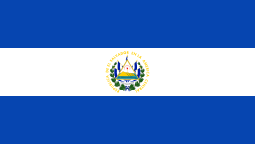
- Group Stage v.
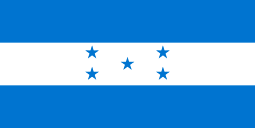
- Group Stage v.

- Group Stage v.

- Group Stage v.

- Group Stage v.

- Group Stage v.
- 2018 CONCACAF Champions League:
- TBD
Player records
Regular season only. Players in bold are active Rapids players.[23]
Top goalscorers
- As of October 23, 2017[24]
| # | Name | Career | MLS | Playoffs | Open Cup | CCL | Total |
|---|---|---|---|---|---|---|---|
| 1 | 2007–2012 | 50 | 2 | 0 | 0 | 52 | |
| 2 | 1997–2001 | 39 | 5 | 1 | 1 | 46 | |
| 3 | 2001–2004 | 37 | 2 | 4 | 0 | 43 | |
| 4 | 2007–2012 | 39 | 1 | 1 | 1 | 42 | |
| 5 | 1996–1998 2002–2005 |
31 | 2 | 4 | 0 | 37 | |
| 6 | 1997–1999 2005 |
27 | 1 | 0 | 0 | 28 | |
| 7 | 2002–2005 | 26 | 1 | 0 | 0 | 27 | |
| 8 | 1996–2001 | 24 | 0 | 0 | 1 | 25 | |
| 9 | 2013–2015 | 20 | 0 | 3 | 0 | 23 | |
| 10 | 2001–2003 | 19 | 1 | 0 | 0 | 20 | |
| 1999–2000 | 17 | 0 | 3 | 0 | 20 |
Other statistics
|
|
Attendance
The following is a list of each year's average attendance, split into numbers for the regular season and the corresponding playoffs, if applicable: On average, the teams has had an attendance of 14,347 for the regular season, and 9,234 for playoff games.
- 1996: 10,213 / DNQ
- 1997: 11,835 / 15,785
- 1998: 14,812 / 6,582
- 1999: 14,029 / 6,542
- 2000: 12,580 / 8,789
- 2001: 16,481 / DNQ
- 2002: 20,687 / 11,002
- 2003: 16,772 / 6,434
- 2004: 14,195 / 8,028
- 2005: 13,638 / 11,207
- 2006: 12,056 / 4,176
- 2007: 14,749 / DNQ
- 2008: 13,659 / DNQ
- 2009: 13,018 / DNQ
- 2010: 13,329 / 14,826
- 2011: 14,838 / 8,202
- 2012: 15,175 / DNQ
- 2013: 15,440 / N/A
- 2014: 15,082 / DNQ
- 2015: 15,657 / DNQ
- 2016: 16,278 / TBD
Affiliations
- Charlotte Independence[25] – United Soccer League (2nd division)
References
- ↑ "Stadium Facts" (PDF). Dick's Sporting Goods Park 2018 Fan Guide. March 23, 2018. Retrieved June 19, 2018.
- ↑ "The Colorado Rapids Major League Soccer Club | Colorado Rapids". Arsenal.com. Archived from the original on October 22, 2012. Retrieved July 9, 2012.
- 1 2 Archived June 16, 2011, at the Wayback Machine.
- 1 2 "Rapids name Gary Smith Head Coach". 9news.com. November 11, 2008. Retrieved December 3, 2011.
- ↑ Archived September 27, 2011, at the Wayback Machine.
- ↑ Archived June 16, 2011, at the Wayback Machine.
- ↑ "SBI MLS Power Rankings". Soccer By Ives. March 16, 2009. Archived from the original on October 3, 2011. Retrieved December 3, 2011.
- ↑ "Rapids Announce Creation Of New Supporters Terrace For 2010". Oursportscentral.com. February 5, 2010. Archived from the original on June 29, 2011. Retrieved December 3, 2011.
- ↑ "Fan tributes on football kits". Proven Quality. February 27, 2013. Archived from the original on February 9, 2014.
- ↑ "Little eye continue to shine – Carrick Gazette". Carricktoday.co.uk. January 19, 2012. Archived from the original on April 7, 2014. Retrieved April 3, 2014.
- ↑ "Colorado Rapids announce 5-year deal with Ciao Telecom as club's first-ever jersey sponsor". MLSsoccer.com. Archived from the original on May 2, 2014. Retrieved May 1, 2014.
- ↑ "Colorado Rapids sue Ciao Telecom over missed sponsorship payments". denverpost.com. October 30, 2014. Archived from the original on April 27, 2015.
- ↑ Crooks, Glen (March 19, 2015). "How Will NYCFC Handle the High Altitude in Colorado". CBS New York. Archived from the original on March 31, 2016.
- ↑ "2002 Final MLS Regular Season Statistics". September 23, 2002. Archived from the original on March 19, 2010{{inconsistent citations}}
- ↑ "Email from Kurt Schwartzkopf CMO, Kroenke Sports & Entertainment".
- ↑ "Cenetennial 38 website". Archived from the original on February 15, 2013{{inconsistent citations}}
- ↑ "Players". Colorado Rapids. Archived from the original on March 6, 2012. Retrieved April 2, 2012.
- ↑ "Gallery of Honor". coloradorapids.com. Archived from the original on November 25, 2017. Retrieved March 28, 2015.
- ↑ https://www.mlssoccer.com/history/trophies/trophies-by-mls-club
- ↑ "Record by year". Colorado Rapids. Archived from the original on November 16, 2016. Retrieved November 15, 2016.
- ↑ "Player statistics". Colorado Rapids. Archived from the original on November 16, 2016. Retrieved November 15, 2016.
- ↑ "Schedule History". Colorado Rapids. Archived from the original on April 2, 2015. Retrieved March 25, 2015.
- ↑ Colorado Rapids All-Time Individual Leaders Archived August 29, 2014, at the Wayback Machine., Accessed August 18, 2016.
- ↑
- ↑ "Rapids, Charlotte Independence reach 2-year affiliate partnership" Archived September 13, 2017, at the Wayback Machine., Denver Post.
